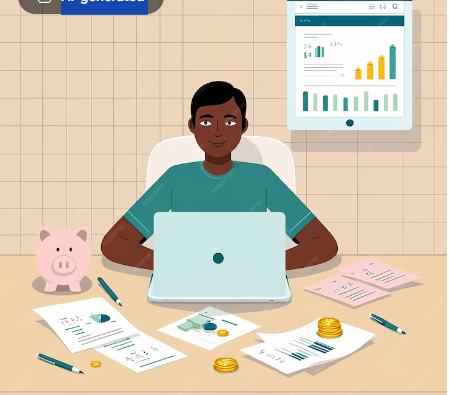Master Your Money: 7 Personal Finance Habits for Everyday Success
7 Personal Finance Habits for Everyday Success
Table of Contents
Financial literacy is a fundamental life skill. It empowers you to make informed decisions about your money, plan for the future, and achieve your financial goals. But where do you begin? This article explores seven practical personal finance habits you can incorporate into your everyday routine to cultivate financial wellness and achieve long-term success.

1. Track Your Spending
Knowing where your money goes is the first step to taking control of it. Many people underestimate how much they spend on unnecessary expenses. Tracking your spending allows you to identify areas where you can cut back and free up resources to allocate towards your financial goals.
- Simple Methods: Pen and paper or a spreadsheet can be surprisingly effective for tracking your spending. There are also numerous free budgeting apps available that can automate the process.
- Benefits: Tracking your spending helps you identify spending patterns, avoid impulse purchases, and stay on track with your financial goals.
- Action Steps: Commit to tracking your income and expenses for a month. Categorize your spending (rent/mortgage, groceries, entertainment, etc.) to gain insights.
2. Create a Budget and Stick to It
A budget is a roadmap for your money. It allocates your income towards your expenses and savings goals. Creating a realistic budget and sticking to it is crucial for achieving financial stability.
- Budgeting Methods: There are various budgeting methods, such as the 50/30/20 rule (50% needs, 30% wants, 20% savings/debt repayment) or zero-based budgeting (every dollar of income is allocated). Choose a method that suits your financial situation and preferences.
- Prioritize Needs vs. Wants: Differentiate between your needs (housing, food, transportation) and wants (entertainment, dining out).
- Automate Savings: Set up automatic transfers to your savings account to ensure a portion of your income is consistently saved.
- Review and Adjust: Regularly review your budget and adjust it as needed based on your income and expenses.
3. Build an Emergency Fund

Life is full of unexpected events. An emergency fund provides financial security during challenging times, such as job loss, medical emergencies, or car repairs.
- Target Amount: Experts recommend saving 3-6 months of living expenses in an emergency fund.
- Start Small: Begin with a small, achievable savings goal and gradually increase your contributions over time.
- Savings Vehicles: Consider a high-yield savings account for your emergency fund. These accounts offer easy access to your money while accruing interest.
4. Pay Down Debt Strategically
Debt can be a significant burden, hindering your ability to save and achieve financial goals. There are various strategies to effectively pay down debt.
- Identify High-Interest Debt: Prioritize paying off high-interest debts (credit cards, payday loans) first, as they accrue interest charges quickly.
- Debt Avalanche vs. Snowball Method: The debt avalanche method focuses on paying off the debt with the highest interest rate first, regardless of the amount. The snowball method prioritizes paying off the smallest debt first, which can provide a motivational boost.
- Consider Debt Consolidation: Debt consolidation can simplify your repayment process by combining multiple debts into a single loan with a lower interest rate.
5. Invest for the Future
Investing allows your money to grow over time. There are various investment options available, each with varying risk-reward profiles.
- Start Early: The power of compound interest magnifies the earlier you begin investing. Even small contributions over time can accumulate significantly.
- Diversify Your Portfolio: Don’t put all your eggs in one basket. Spread your investments across various asset classes (stocks, bonds, real estate) to mitigate risk.
- Invest Regularly: Consider setting up a recurring investment plan to consistently contribute to your investment portfolio, regardless of market fluctuations.
- Educate Yourself: There are numerous resources available to help you learn about investing. Consider consulting a financial advisor for personalized investment guidance.
6. Automate Your Finances
Automating your finances streamlines your money management and reduces the risk of missed payments or late fees.
- Schedule Bill Payments: Set up automatic bill payments to ensure your bills are paid on time and avoid incurring late fees.
- Automate Savings: Schedule automatic transfers from your checking account to your savings account to effortlessly build your savings over time.
- Automate Investments: Set up automatic investments to consistently contribute to your investment portfolio, regardless of market conditions.
7. Review Your Financial Goals Regularly

- Short-Term vs. Long-Term Goals: Identify both short-term (saving for a vacation) and long-term goals (retirement) to maintain a balanced perspective.
- Adjust Your Plan: As your goals and circumstances change, adapt your financial plan accordingly. For example, a raise might allow you to increase your retirement contributions.
- Celebrate Milestones: Acknowledge and celebrate your financial achievements. This helps maintain motivation and keeps you focused on your long-term goals.
Bonus Tip: Embrace Continuous Learning
The financial landscape is constantly evolving. Commit to ongoing financial literacy.
- Read Books and Articles: Numerous personal finance books and articles offer valuable insights and strategies.
- Listen to Podcasts: Financial podcasts provide a convenient and engaging way to learn about money management.
- Seek Professional Advice: Consulting a financial advisor can be beneficial for creating a personalized financial plan and navigating complex financial decisions.
Conclusion
Financial wellness is a journey, not a destination. By incorporating these seven personal finance habits into your daily routine, you can gain control of your money, achieve your financial goals, and build a secure future. Remember, consistency is key. Start small, be patient, and celebrate your progress along the way.
Additional Resources:
- National Endowment for Financial Education: [National Endowment for Financial Education nefe.org]
- The Motley Fool: [The Motley Fool motleyfool.com]
- Investopedia: [Investopedia investopedia.com]
- Consumer Financial Protection Bureau: [Consumer Financial Protection Bureau (.gov) consumerfinance.gov]
By implementing these habits and leveraging the resources available, you can take charge of your finances and unlock a world of financial possibilities.






